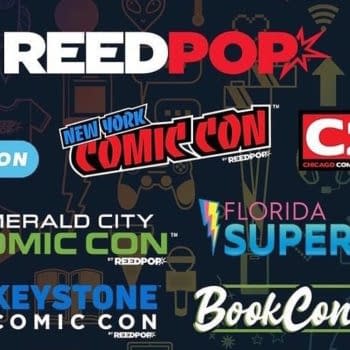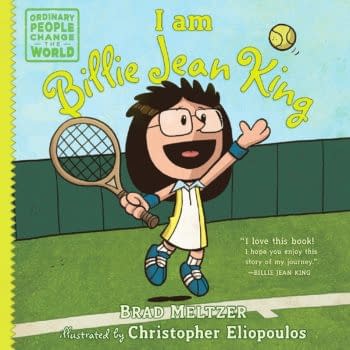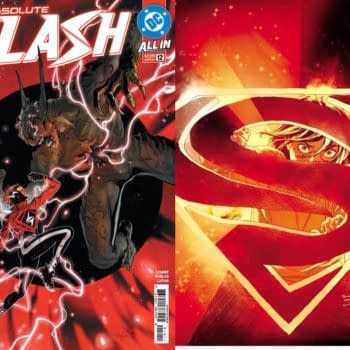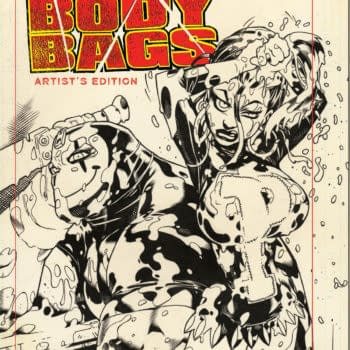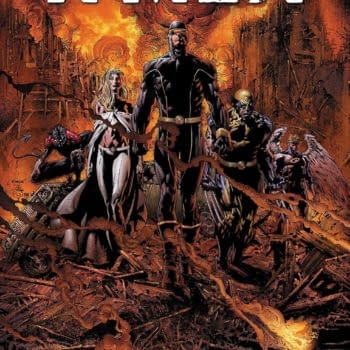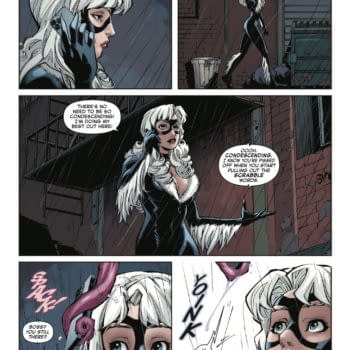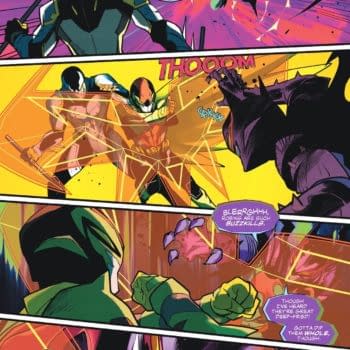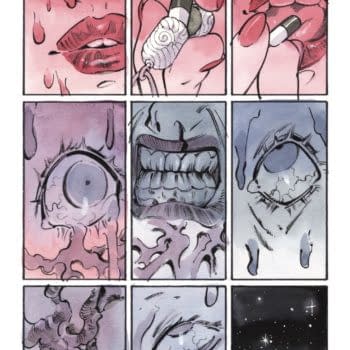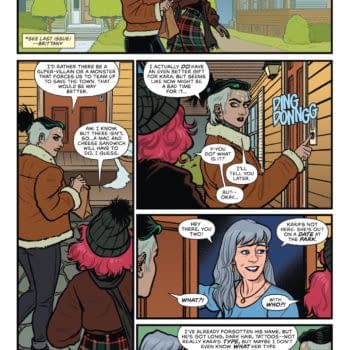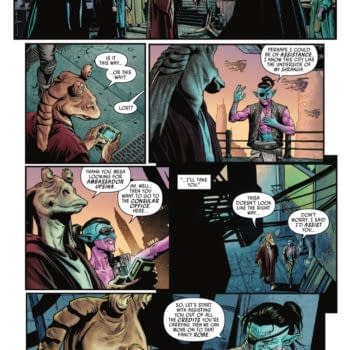Posted in: Comics | Tagged: Comics, entertainment
Why I Didn't Expect To Get Into The DC Comics Writer's Program
DC Comics quietly blew a bunch of minds in and around the comic book industry earlier this year when it announced that it would be holding open submissions for "Talent Development Workshops, after a successful pilot program in late 2015. It seems like a lot of us applied to this DC Writers Workshop and didn't get in. Like many, I applied more or less on a lark, so I wasn't all that surprised when I found out that I hadn't made the cut. What was surprising, was that my lack of shock seemingly put me in the minority amongst those rejected.
Up until that afternoon, if you went on to Twitter, or Instagram and searched for "#dctalent" (or some variation of that) you'd have found a lot of fan posts from individuals who are not presently working on a professional level within the comic book industry — but who were all waiting with bated breath to get Willy Wonka's golden ticket, and fulfill their dream of writing "that one Batman story".
I applied for both the artist's and the writer's workshop, so I had already gotten my first rejection letter regarding the artist workshop two months before the second one arrived. I got the standard writer's workshop rejection letter, which is basically a considerate boiler plate. I chuckled and moved back to what I had been working on before the email landed in my inbox. What I didn't expect though was the rather dramatic backlash that began to occur. Friends who applied had started texting and messaging, venting, expressing surprise and, in some cases, mild defeat. Then I started looking online, on Facebook and the aforementioned Twitter and Instagram and it turns out a lot of people had pinned their hopes and dreams on this workshop, and the majority of them actually were professionals.
I'm all for getting a leg up however you can, not to mention expanding your knowledge base to assist in growth, but to me these workshops were billed as a means by which DC could groom already established artists and writers in how to work within their editorial system. Not teach you how to write and draw. Even within the camp of qualified writers and artists (if there were even a way to objectively measure that), being qualified or great isn't enough to necessarily guarantee any of us a job at DC Comics. They are a business, owned by Warner Bros., and the comics represent hundreds of millions of dollars of invested capital behind them. So it isn't enough to be good, you have to be someone so good there is little to no risk on their part due to mishandling. That's not even taking into account the simplest explanation which is we are all different and maybe some of us just aren't the right flavor for these characters, and/or DC's talent scouts right now.
I've been working professionally for five years, but I've been in and around the industry since about 2006. I was fortunate to be taken under the wing by creators and industry professionals from what I will refer to as the "old guard". These were individuals who came up in the 80s and 90s, had worked through the great collapse of the direct market and stuck it out to see the renaissance begin in the early 2000s. When I started coming around, the other people I met who were attempting to break into comics were doing so because they wanted to make comics. Anyone who came sniffing around expressing a desire to create a comic just to get it made into a movie or a tv show was not only looked down on seemingly, they were laughed out of a lot of rooms. That changed though. We've entered the era of IP now, and as a result it could really be said we are in the era of comic book writer/creator as de facto rockstar.
I had the chance to co-write a short story for DC in 2015 and I can guarantee you working for them is unlike anything most of us are accustomed to. My short tenure also coincided with DC's move to Burbank so a lot of the process was still being hammered out but suffice it to say, even the editors were adapting to the new system and to be totally honest, it was a bit uncomfortable. DC had implemented a number of failsafes to ensure the timely delivery of the product, with several layers of redundancy to make sure nothing slipped through the cracks, which basically meant that all elements of the production line were compartmentalized. Meaning there was not to be any communication, except through the editor. As complicated as this sounds, if you are in the business of shepherding IP, and doing it in a reliable, timely manner, this method actually makes a lot of sense.
Ultimately though, I was proud of what was produced and it felt pretty fucking cool to go into my first comic shop from my childhood and buy the first DC comic I ever was in. Total feather in the cap, but it was just that. My life didn't change. With the rejections of the writer's workshop though, it would seem that there is a pervasive desperation amongst cartoonists to succeed, to "make it", which it would seem means becoming famous at DC, or Marvel for that matter, so that they can then get a book at Image and become Robert Kirkman.
If I'm totally honest, the reasons I wanted to work at DC disappeared a long time ago; SOLO, Batman Black and White, hell, what Vertigo used to be. My insane reason for applying was in thinking that maybe there was an element of that still somewhere lurking in a corner of their offices somewhere. And maybe there is, we just don't have any way of knowing presently. Or more likely in my case, I'm just not good enough. The realm of the writer/artist has seemingly been relegated to the land of independent publishers, unless you were lucky enough to be grandfathered in. Personally, I'm fine with that. I always wanted to tell my own stories, I just thought that it would be fun to maybe get to draw Batman once for money. The scary thing to me is that now most of the pitches we create for these indie publishers are evaluated on their strength as a potential film or television show, not as a comic. Scarier than that we are pandering to this methodology, because we all want to make comics so badly. Regardless, the industry has changed, and it will continue to do so and we must in turn adapt.
Where does that leave all of us then? The ones who cannot count themselves amongst the chosen few. A better question to ask ourselves is: does it even matter?
You would think we all just got turned down for jobs, when in reality, we were turned down to go through two hoops and then maybe get a job. Some may say that's more disheartening but I don't agree. It's the same kind of logic that is prevalent amongst academics and college graduates, that if you simply get through an allotted period of study, and walk away with a piece of paper proving your effort, that you are in turn entitled to a high paying job of your choice. It simply doesn't work that way in reality.
I love making comics. I love the history of them, both here in the states as well as abroad, I love the lineage but most of all I love being a bastard: standing at the intersection of fine arts, and commercial art, pulp fiction and fine prose. It's not to say comics aren't a serious art form, it's just that we have our own thing going on which only serves to boggle the minds of a great many MFAs in my experience. Our chosen craft and how we go about it is WIDE open in large part due to the proliferation of desktop publishing and the internet. I mean, there's an erotic webcomic about the sex lives of hobbits and elves that generates $5k a month through Patreon. We have no excuses. We aren't amongst the chosen few, we are the many who choose to make comics.
I have made my living for the past two years on comic book work alone, for which I'm grateful. I've gotten jobs through recommendations from friends, editors finding me online, or pitching my original concepts to publishers. I know that to be the case for the majority of us, on all the different echelons of success within the field. We're hustlers. We don't realize how extremely rare that is in this day and age, to not be asked where we went to school, if we went to school for that matter, and while never being asked for a resume, to in turn be judged solely upon merit. That's something that was lost in the last century.
So in some ways nothing has changed, it's just easier for us to make our own comics now, to continue producing and helping one another, by sharing knowledge and resources. We cannot and should not measure ourselves in the infinitely varied field we are apart of, by whether or not a corporation deems us worthy. Certainly as comic book creators, writers and cartoonists, our work stands outside the tidy summation of a one page resume. I found that in the course of the past decade it wasn't even apart of the conversation. In fact, I never needed a resume up until recently, about three months ago.
When I applied for the DC workshops.
Chris Hunt, is an American cartoonist from Boise, Idaho most recently residing in New York City who mostly writes about the things he knows, such as whisky and cigarettes. He has been working primarily in comics for the past five years, but has also done a number of projects within the music and film industry. Past clients include Dark Horse Comics, Universal Music Group, Biz3 Mgmt, ZIP Comics, and IDW Comics. In 2010, Hunt was invited to study as a resident artist, at The Atlantic Center for The Arts (ACA) under Master Artist, Paul Pope.
In June of 2016, Hunt completed work on CARVER: A Paris Story, his first full-length graphic novel which expands the story of, Francis Carver, the gentleman of fortune that premiered in Hunt's self-published, VOLUME ONE in 2010.









